20 Power-Packed Foods That Naturally Lower Blood Pressure
Living with high blood pressure doesn’t mean a lifetime of medication.
Nature provides powerful solutions through everyday foods that can help regulate your blood pressure naturally.
I’ve researched and compiled this comprehensive guide to help you make informed choices for your heart health.
Whether you’re looking to prevent hypertension or manage existing blood pressure issues, incorporating these foods into your diet can make a significant difference.
You’ll discover how simple dietary changes can lead to remarkable improvements in your cardiovascular health.
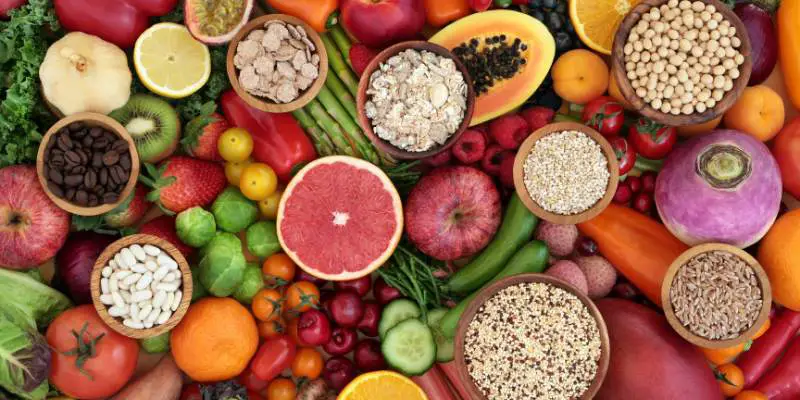
Fruits
Bananas
Packed with potassium, bananas are your heart’s best friend.
This portable fruit helps regulate sodium levels in your body, naturally lowering blood pressure.
When you eat a banana, you’re giving your body essential minerals that support healthy blood vessel function.
The natural sugars in bananas provide steady energy throughout the day, making them perfect for breakfast or pre-workout snacks.
You’ll find them particularly effective when consumed regularly as part of your morning routine.
Research shows that eating bananas can help maintain blood vessel elasticity, contributing to better blood pressure control.
Their fiber content also helps maintain healthy cholesterol levels.
Nutrition Info: One medium banana (118g) contains 105 calories, 27g carbs, 1.3g protein, 0.4g fat, 3.1g fiber, 422mg potassium, 32mg magnesium, and 20% of your daily vitamin B6 needs.
Berries

These small but mighty fruits pack a powerful punch of antioxidants and flavonoids.
Whether you choose strawberries, blueberries, or raspberries, you’re getting natural compounds that help dilate blood vessels.
Regular berry consumption has been linked to improved arterial function and reduced blood pressure levels.
The anthocyanins in berries protect your blood vessels from damage and inflammation.
You’ll find berries particularly beneficial when consumed daily, either as a snack or added to your breakfast.
Their versatility makes them easy to incorporate into your diet.
Nutrition Info: One cup of mixed berries (150g) provides 85 calories, 20g carbs, 1.5g protein, 0.5g fat, 7g fiber, 210mg potassium, and over 85% of your daily vitamin C needs.
Watermelon

This summer favorite contains L-citrulline, an amino acid that helps produce nitric oxide.
Nitric oxide is crucial for relaxing blood vessels and improving blood flow throughout your body.
Watermelon’s high water content makes it excellent for hydration, which is essential for maintaining healthy blood pressure.
You’ll appreciate its refreshing taste while supporting your cardiovascular health.
The natural sweetness makes it an excellent alternative to processed snacks, and its versatility allows you to enjoy it in various ways.
Nutrition Info: One cup of watermelon (152g) contains 46 calories, 11.5g carbs, 0.9g protein, 0.2g fat, 0.6g fiber, 170mg potassium, and 12.3mg vitamin C.
Pomegranate

Rich in polyphenols, pomegranates offer powerful antioxidant benefits that support heart health.
These ruby-red seeds help reduce arterial plaque and improve blood flow.
Studies show that pomegranate juice can help maintain healthy blood pressure levels and protect your arteries from damage.
You’ll find the seeds make an excellent addition to salads or as a standalone snack.
Regular consumption has been linked to improved cardiovascular function and reduced oxidative stress in blood vessels.
Nutrition Info: One cup of pomegranate arils (174g) provides 144 calories, 33g carbs, 3g protein, 2g fat, 7g fiber, 666mg potassium, and 28% of your daily vitamin C needs.
Kiwi
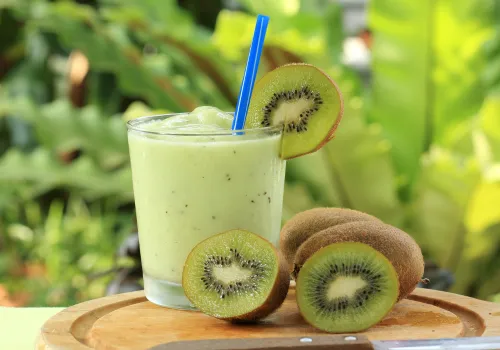
This fuzzy fruit is a powerhouse of vitamin C and potassium.
Kiwis help regulate blood pressure through their unique combination of nutrients and bioactive compounds.
Regular consumption of kiwis has been shown to reduce both systolic and diastolic blood pressure.
You’ll find them particularly effective when eaten consistently over time.
Their high fiber content also supports overall heart health by helping maintain healthy cholesterol levels.
Nutrition Info: Two medium kiwis (140g) contain 90 calories, 21g carbs, 1.8g protein, 0.8g fat, 4.2g fiber, 430mg potassium, and 230% of your daily vitamin C needs.
Vegetables
Leafy Greens
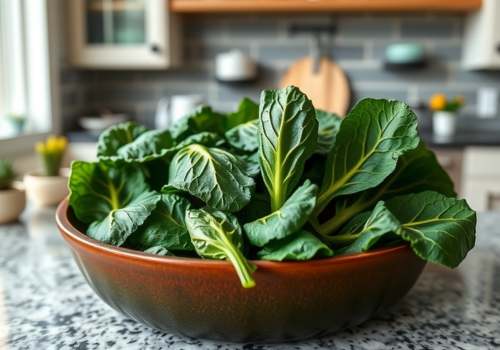
Spinach, kale, and collard greens are rich in nitrates and magnesium.
These nutrients are essential for blood pressure regulation and overall cardiovascular health.
The high potassium content in these greens helps counteract the effects of sodium in your diet.
You’ll notice improved energy levels when incorporating more leafy greens into your meals.
These versatile vegetables can be enjoyed raw in salads, sautéed as a side dish, or blended into smoothies.
Nutrition Info: One cup of raw spinach (30g) contains 7 calories, 1.1g carbs, 0.9g protein, 0.1g fat, 0.7g fiber, 167mg potassium, and 56% of your daily vitamin A needs.
Beetroot

Packed with natural nitrates, beetroot helps your body produce nitric oxide.
This compound relaxes and dilates blood vessels, improving blood flow and lowering blood pressure.
You’ll find both raw and cooked beets effective in supporting healthy blood pressure levels.
The natural sweetness makes them an excellent addition to salads and smoothies.
Regular consumption has been shown to provide both immediate and long-term benefits for cardiovascular health.
Nutrition Info: One cup of raw beetroot (136g) provides 58 calories, 13g carbs, 2.2g protein, 0.2g fat, 3.8g fiber, 442mg potassium, and 11% of your daily vitamin C needs.
Sweet Potatoes

Rich in beta-carotene and potassium, sweet potatoes help maintain healthy blood pressure levels.
Their high fiber content supports overall heart health.
You’ll appreciate how these versatile tubers can replace regular potatoes in most recipes while providing superior nutritional benefits.
Their natural sweetness makes them a satisfying addition to any meal.
The combination of nutrients in sweet potatoes helps reduce inflammation and support blood vessel health.
Nutrition Info: One medium sweet potato (114g) contains 103 calories, 24g carbs, 2g protein, 0.2g fat, 3.8g fiber, 542mg potassium, and 438% of your daily vitamin A needs.
Celery

Known for its natural compounds that help relax blood vessels, celery is a traditional remedy for high blood pressure.
Its high water and fiber content support overall cardiovascular health.
Regular consumption of celery has been linked to reduced blood pressure levels.
You’ll find it makes an excellent low-calorie snack or addition to soups and salads.
The combination of minerals and antioxidants in celery helps maintain healthy blood vessel function.
Nutrition Info: One cup of chopped celery (120g) provides 14 calories, 3g carbs, 0.7g protein, 0.2g fat, 1.6g fiber, 263mg potassium, and 8% of your daily vitamin A needs.
Bell Peppers

Bursting with vitamin C and antioxidants, bell peppers are excellent for cardiovascular health.
Their diverse colors indicate different antioxidant profiles, each supporting blood pressure regulation in unique ways.
These versatile vegetables can help strengthen your blood vessels and reduce inflammation.
You’ll find them easy to incorporate into various dishes, from salads to stir-fries.
Regular consumption supports overall heart health while providing essential nutrients for immune function.
Nutrition Info: One medium bell pepper (119g) contains 37 calories, 7g carbs, 1.2g protein, 0.4g fat, 2.5g fiber, 200mg potassium, and 169% of your daily vitamin C needs.
Proteins & Dairy
Fatty Fish
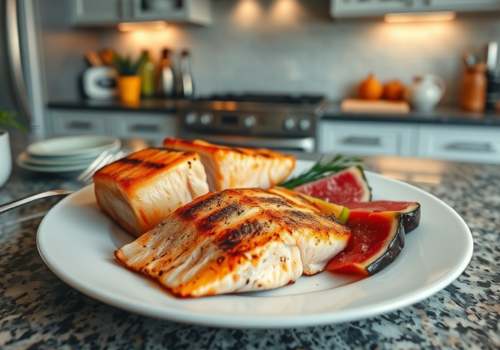
Rich in omega-3 fatty acids, fatty fish like salmon, mackerel, and tuna support heart health.
These essential fats help reduce inflammation and maintain healthy blood pressure levels.
You’ll benefit from eating fatty fish at least twice a week.
The combination of protein and healthy fats helps promote satiety while supporting cardiovascular function.
Research shows that regular consumption can help reduce both systolic and diastolic blood pressure.
Nutrition Info: One 3.5 oz serving of salmon (100g) provides 208 calories, 0g carbs, 22g protein, 13g fat, 0g fiber, 363mg potassium, and high levels of omega-3 fatty acids.
Greek Yogurt

High in protein and calcium, Greek yogurt supports healthy blood pressure regulation.
Its probiotics content may also contribute to cardiovascular health through gut-heart connection.
You’ll appreciate its versatility as a breakfast option or snack.
The protein content helps maintain steady blood sugar levels, indirectly supporting blood pressure control.
Regular consumption can help meet your daily calcium needs while providing beneficial probiotics.
Nutrition Info: One cup of plain Greek yogurt (245g) contains 130 calories, 9g carbs, 23g protein, 0.7g fat, 0g fiber, 240mg potassium, and 20% of your daily calcium needs.
Eggs

Packed with protein and vitamin D, eggs support overall cardiovascular health.
They contain essential nutrients that help maintain healthy blood vessel function.
Research shows that eggs can be part of a heart-healthy diet when consumed in moderation.
You’ll benefit from their complete protein profile and essential nutrients.
The combination of nutrients in eggs helps support overall heart health while providing sustained energy.
Nutrition Info: One large egg (50g) provides 72 calories, 0.4g carbs, 6.3g protein, 4.8g fat, 0g fiber, 69mg potassium, and 41mg calcium.
Nuts & Seeds
Pistachios

Rich in potassium and healthy fats, pistachios help maintain healthy blood pressure levels.
Their protein and fiber content makes them a satisfying snack option.
Regular consumption has been linked to improved cardiovascular health markers.
You’ll find them particularly effective when used as a replacement for less healthy snacks.
The combination of nutrients in pistachios supports overall heart health while providing sustained energy.
Nutrition Info: One ounce of pistachios (28g) contains 159 calories, 8g carbs, 6g protein, 13g fat, 3g fiber, 291mg potassium, and 3% of your daily iron needs.
Flaxseeds
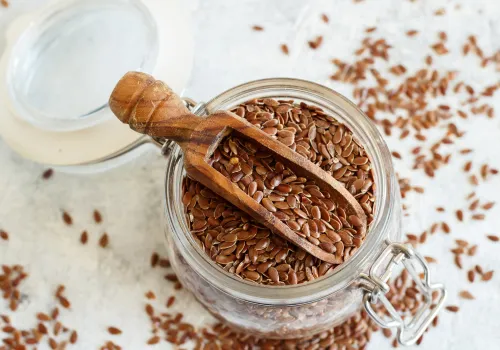
High in alpha-linolenic acid and fiber, flaxseeds support cardiovascular health. These tiny seeds pack a powerful punch of omega-3 fatty acids and lignans.
You’ll benefit most from ground flaxseeds, as they’re easier for your body to digest.
Regular consumption helps maintain healthy blood pressure levels while supporting overall heart health.
Their versatility makes them easy to incorporate into various dishes, from smoothies to baked goods.
Nutrition Info: One tablespoon of ground flaxseeds (10g) provides 37 calories, 2g carbs, 1.3g protein, 3g fat, 1.9g fiber, 57mg potassium, and 2% of your daily iron needs.
Chia Seeds
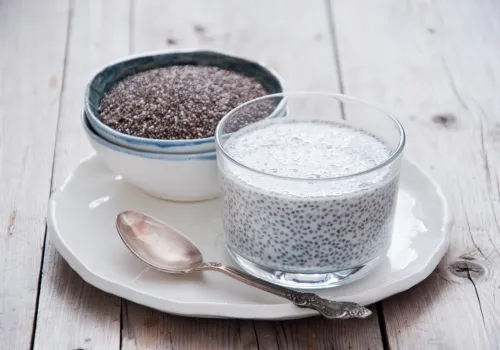
Loaded with omega-3 fatty acids and fiber, chia seeds support heart health.
Their unique ability to absorb water makes them excellent for maintaining hydration.
Regular consumption helps maintain healthy blood pressure levels through their high mineral content.
You’ll find them easy to incorporate into various dishes.
The combination of nutrients in chia seeds supports overall cardiovascular health while providing sustained energy.
Nutrition Info: One ounce of chia seeds (28g) contains 137 calories, 12g carbs, 4.4g protein, 8.6g fat, 10.6g fiber, 115mg potassium, and 18% of your daily calcium needs.
Pumpkin Seeds
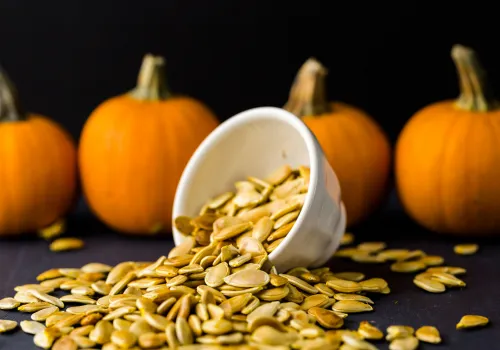
Rich in magnesium and potassium, pumpkin seeds support healthy blood pressure levels.
These nutrients are essential for proper muscle and nerve function.
Regular consumption helps maintain cardiovascular health through their mineral content.
You’ll appreciate their versatility as a snack or salad topping.
The combination of nutrients in pumpkin seeds supports overall heart health while providing plant-based protein.
Nutrition Info: One ounce of pumpkin seeds (28g) provides 151 calories, 5g carbs, 7g protein, 13g fat, 1.1g fiber, 223mg potassium, and 37% of your daily magnesium needs.
Other Foods
Dark Chocolate

High in flavonoids, dark chocolate helps improve blood vessel function.
Choose varieties with 70% or higher cocoa content for maximum benefits.
Regular consumption in moderation has been linked to improved cardiovascular health.
You’ll find it satisfying as an occasional treat while supporting heart health.
The antioxidants in dark chocolate help protect blood vessels and maintain healthy blood pressure.
Nutrition Info: One ounce of 70% dark chocolate (28g) contains 170 calories, 13g carbs, 2.2g protein, 12g fat, 3g fiber, 200mg potassium, and 6% of your daily iron needs.
Oatmeal

Rich in soluble fiber, oatmeal supports heart health and blood pressure regulation.
Its high fiber content helps maintain steady blood sugar levels.
Regular consumption helps reduce both cholesterol and blood pressure levels.
You’ll find it particularly effective when consumed as part of your morning routine.
The combination of nutrients in oatmeal supports overall cardiovascular health while providing sustained energy.
Nutrition Info: One cup of cooked oatmeal (234g) provides 158 calories, 27g carbs, 6g protein, 3.2g fat, 4g fiber, 164mg potassium, and 2% of your daily calcium needs.
Green Tea

Packed with catechins and antioxidants, green tea supports cardiovascular health.
Regular consumption helps maintain healthy blood pressure levels through various mechanisms.
You’ll benefit from its natural compounds that help improve blood vessel function.
The mild caffeine content provides gentle energy without significant blood pressure effects.
Research shows that regular green tea consumption can help reduce blood pressure over time.
Nutrition Info: One cup of brewed green tea (240ml) contains 2 calories, 0g carbs, 0g protein, 0g fat, 0g fiber, 20mg potassium, and various beneficial compounds.
Final Thoughts
Incorporating these foods into your daily diet can significantly impact your blood pressure management journey.
Remember that consistency is key – it’s not about making dramatic changes overnight but building sustainable habits over time.
Your heart health is a reflection of your daily choices.
By choosing these nutrient-rich foods regularly, you’re investing in your long-term cardiovascular wellness.
Start with small changes and gradually build up to a heart-healthy eating pattern that works for you.
